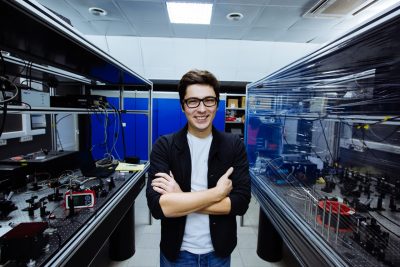Postdoc Spotlight: Maxim Shcherbakov

Maxim Shcherbakov is featured as part of Cornell’s Postdoc Appreciation Week 2018.
Maxim Shcherbakov is from Pushchino, Moscow Oblast, Russia and has a PhD in laser physics from Lomonosov Moscow State University. He conducts research in the field of nanophotonics in Gennady Shvets’ lab in Applied and Engineering Physics.
What is your area of emphasis? Why is this work important?
I study how light interacts with artificial nanomaterials, which we sometimes like to call “metamaterials.” If you try hard enough, you can make them have properties you wouldn’t expect them to have, and that’s when things start getting interesting. There’s a large community working on various types of metamaterials, and I am interested in those that are nonlinear and tunable. Nonlinear metamaterials can make light interact with light, and may serve as building blocks for novel photonic chips and all-optical logic elements. Tunable metamaterials can shape light waves on demand, and we have recently teamed up with Samsung Electronics to apply our knowledge in their mixed reality devices.
Have you won any awards or fellowships?
I was selected for a major Russian Science Foundation grant award, project name: “Nonlinear optics of all-dielectric metamaterials” (2014), the youngest principal investigator funded by that competition; also the Moscow Government Young Investigator award (2015), a competitive award with a cash prize; received a DAAD Scholarship for a research stay at Friedrich Schiller University, Germany (in the group of Professor Thomas Pertsch, 2011); and an SPIE (International Society for Optics and Photonics) Scholarship for graduate students in 2011.
What inspired you to choose this field of study?
I was in my undergrad when I came across a visionary talk by Richard Feynman, “There’s Plenty of Room at the Bottom.” It struck me how ineffectively we utilize the space around us, and how much stuff can be squeezed even onto a needle’s apex. It is probably only in the past decade or so we have finally developed tools to build materials on the scale beyond the size of the smallest virus, and, naturally, I didn’t want to miss an opportunity to study this exciting field.
How has your background influenced your scholarship?
I grew up in a small town on the outskirts of Moscow, which is based on several research institutes. Being surrounded by academics made me susceptible to ideas of trying to understand the world around us and to critically evaluate past beliefs. That’s where I found that the academic lifestyle and ideology are something I admire and aspire toward. My interest specifically in optics was fueled by my PhD advisor Andrey Fedyanin and the fantastic people at the Quantum Electronics department of my alma mater.
What else has influenced your thinking as a researcher or scholar?
My parents, who challenged me with “what if” questions and made me form my own opinion about things around me; my teachers, who made me see how little there is that I cannot do; my students, who keep me on my toes; and the science communications community, which overturned my understanding of how you can convey your ideas to others.
What other hobbies or activities do you enjoy in your spare time?
I write and play music, enjoy a good chess game and time with my wife and kids.
Why did you choose Cornell?
So many decisive factors, I don’t know where to start. I first heard of Cornell, again, through Feynman’s Messenger Lectures, in a book form at that time. Then, as I grew as a scholar, other names started popping up in connection with Cornell: Rabi, Bethe, Moerner, Sagan, too many to name them all! Cornell’s Nanoscale Facility is the cradle of contemporary nanophotonics, and I’m so blessed to be able to work there. Ithaca is a fantastic place reminding me of my hometown, and my family loves it here. Honestly, I don’t think I could have gotten myself a better place for a postdoc.
What’s next for you?
I’m very much looking into starting my own research group in the coming year or two. Cornell, and especially working with my advisor Gennady Shvets, gave me plenty of new ideas, and I can’t wait to bring them into life!
Do you have any advice for current graduate students?
Graduate school is one of the most productive periods of a lifetime. Although keeping work/life balance is important to stay productive, remember to seize the day, don’t miss on opportunities to grow as a researcher, and catch your hot streaks!
